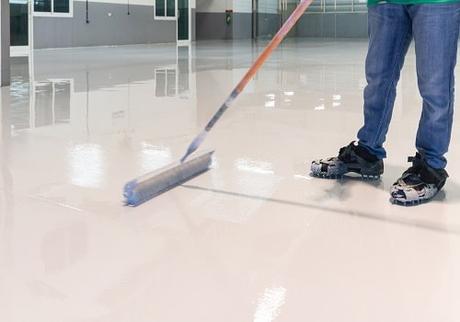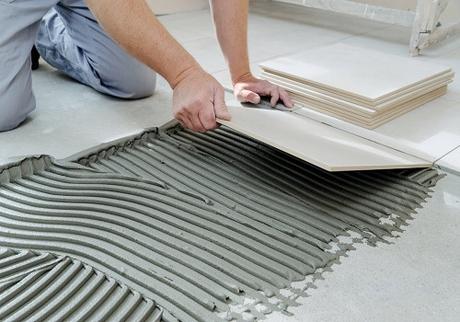If you have been thinking about floor remodeling, then you have probably at one time wondered which floor type could be ideal for your home. For decades, tiles have been the perfect flooring option for many homeowners. They are easy to install, quick to clean, and affordable. Though created in the 1930s, epoxy flooring has, in the past few decades, become a versatile flooring option widely used in garages, homes, and commercial premises. Is epoxy flooring better than tiles? Continue reading to uncover the main differences between the two so you can determine which one is right for your home before contacting a floor remodeling contractor.
Aesthetics- Which One Looks Better?
Your home remodeling contractor will tell you that tiles are naturally known for bringing out a room’s beauty. Creating a centerpiece of tiles on your floor can be risky, but it can give the room a unique upscale look if done right. Tiles are also easy to customize to suit your room’s color and layout. Over and above, tile flooring aesthetics give your floor a durable, modern finish.

Epoxy flooring is also good looking and customizable. Compared to tiles, it is more pleasing to look at. To give an epoxy flooring a shiny appearance, sprinkle a few flakes of color on it. Floor remodeling experts tend to use flakes that allow the epoxy floor to mimic the look of marble, making it a better choice.
Tile flooring has its merits, especially when it comes to giving the floor a durable, stylish finish. Epoxy floors are shiny, making them an ideal choice for a garage. Another perk that comes with using epoxy for flooring and not tiles is that you can give your garage a modern shine at an affordable price.
Water Absorption
It is not uncommon to see water on the floor, especially in the kitchen and restroom. If the water is left to seep through the joints of a tile flooring, it can damage it. Most tiles are not resistant to water. Their joints allow water to seep in, which causes damage and gives room for bacteria to thrive. After some time, the bacteria disintegrate the grout and erodes the joints. Although the tile may appear undamaged on top, the bacteria will have damaged its interior, weakening the floor.
Epoxy floor remodeling done right will not crack or shrink, making it a perfect flooring option for wet areas such as bathrooms. It is also resistant to harsh chemicals that are found in cleaning products. Unlike cement grout, epoxy does not need sealing because it has pores.
Durability
Many types of tiles, such as ceramic and porcelain, cannot withstand harsh chemicals. Although chemical detergents can clean stains on a tile flooring, they eventually cause discoloration and chipping. If you frequently interact with harsh chemicals, you should let your home remodeling contractor know that you need something that can withstand them. Floors that cannot withstand substantial activity in an office or garage will frustrate you in the long run.
The two coatings that determine epoxy flooring durability are polyamine and resin. They are mixed to form a hard coating. The composition can withstand harsh cleaning chemicals and other elements. For this reason, epoxy flooring can last years before chipping, fading, or becoming loose. Because it has no grout lines and does not need extra adhesives, it never comes out or shows a sign of moving when the floor is in place. This makes epoxy an ideal choice for flooring commercial and residential areas. Epoxy floors also repel sun-related issues such as fading and drying out.
Cleaning
From simple motor oil to spilled drinks, your commercial flooring will take on messes. You want to install easy-to-clean floors anytime there is an incident. Tile flooring cleaning is slightly stain-resistant. But it’s advisable to always caught the stain quickly and straight away. Some types of tile can absorb messes, leaving permanent damage on your floor.

On the other hand, epoxy flooring is highly stain-resistant when exposed to various chemicals. Just a quick wipe on the floor will clean everything you may have spilled.
With tiles, you may have to remove some pieces to repair the affected areas. Epoxy’s nonporous surface makes it a better choice because it is stain-resistant.
Maintenance
Regular floor maintenance helps minimize unnecessary expenses in the year while ensuring they are in perfect working condition. Simple preventive care, such as cleaning, can go a long way in preventing high future maintenance costs. With epoxy flooring maintenance, you only need to sweep the debris and mop the floor often to maintain neatness.
Depending on your tile flooring selection, you may need to have it resealed. The process can be expensive and time-consuming because you have to remove everything from the space and wait for the sealant to dry before bringing everything back. You also need to monitor the grout to ensure there is no cracking. Grout is used in every piece to make sure it adheres, and you may have to re-grout it every other time.
Given that epoxy flooring offers a congruent surface, there are no grout lines that require maintenance. Maintaining its cleanliness is, therefore, straightforward. It will not break if you happen to drop a heavy substance on it. On the contrary, a tile can break if you drop something heavy on it.
Environment-friendly
Tile’s cleaning chemicals are harsh and can leave toxic fumes in your environment. On the other hand, an epoxy finish has a resin coating that does not dissolve for some time. Therefore, the floor does not need harsh cleaning chemicals, making epoxy one of the safest floor types to install in rooms that are cleaned most frequently, such as the kitchen.
Final Thoughts
Whether your next project is a commercial or home remodeling, the choice of flooring can significantly impact the room’s first impression. Epoxy flooring is durable and beautiful. The unique surface will add beauty coupled with versatility to your home without the fuss or worry over heavy maintenance. Epoxy has been known to stand the test of time. It neither cracks nor stains. When it is finally time to have a remodeling contractor fix your floor, go with epoxy. It comes with more pros than cons.
================================================================
Author Bio:
This article is written by Lynnet Kwamboka of HelloProject [https://www.helloprojectusa.com/]. A website that connects best in class contractors with homeowners needing a project completed.
